Nouns are an essential part of any language, serving as the building blocks of sentences and providing the names for people, places, things, and ideas. They are crucial in conveying meaning and understanding in communication. Without nouns, language would be incomplete and confusing.
Plural nouns, on the other hand, refer to more than one person, place, thing, or idea. They are formed by adding certain endings or changing the spelling of the singular form of the noun. Understanding plural nouns is important for clear and effective communication, as they help specify whether we are talking about one or more than one of something.
Nouns and Plural Nouns
Nouns come in various forms, such as common nouns, proper nouns, concrete nouns, abstract nouns, and collective nouns. Common nouns refer to general things, while proper nouns are specific names of people, places, or things. Concrete nouns are tangible objects that can be seen, touched, or felt, while abstract nouns represent ideas, emotions, qualities, or states. Collective nouns refer to groups of people or things as a single entity.
Plural nouns are formed in different ways depending on the singular form of the noun. Most plural nouns are created by adding “s” or “es” to the singular form. For example, “cat” becomes “cats,” and “bus” becomes “buses.” Some nouns undergo spelling changes, such as changing the final “y” to “i” before adding “es,” as in “baby” to “babies.” Irregular plural nouns do not follow a specific rule and must be memorized, such as “child” to “children” and “man” to “men.”
Understanding the difference between singular and plural nouns is important for subject-verb agreement in sentences. The verb form must match the noun form in number, ensuring that the sentence is grammatically correct. Misusing singular and plural nouns can lead to confusion and ambiguity in communication.
When writing or speaking, it is crucial to pay attention to the use of nouns and plural nouns to convey your message clearly. Using the correct form of nouns enhances the readability and coherence of your sentences. Practice identifying and using nouns and plural nouns in your everyday communication to improve your language skills.
In conclusion, nouns and plural nouns play a vital role in language and communication. They provide names for people, places, things, and ideas, allowing us to express ourselves effectively. Understanding the different forms of nouns and how to create plural nouns is essential for clear and accurate communication. By mastering the use of nouns and plural nouns, you can enhance your language proficiency and convey your thoughts with precision.
